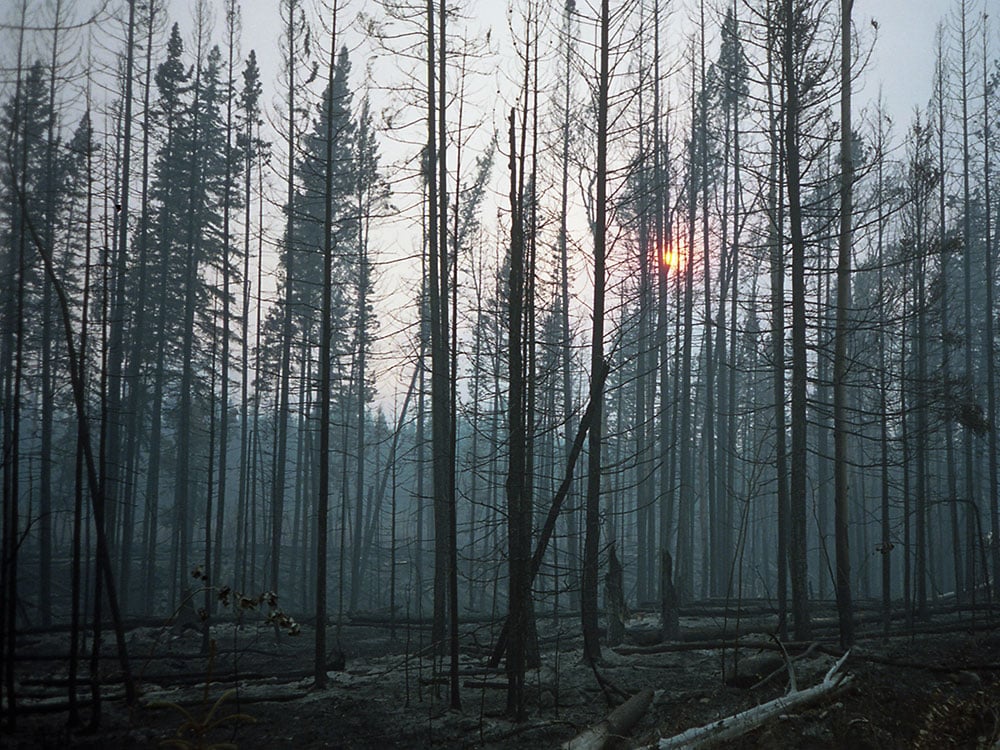Climate change is the greatest existential threat to society, driving wildfires, flooding and species extinctions.
But, because voters care deeply about combating climate change, climate action — or, too often, lip-service in support of climate action, like Prime Minister Justin Trudeau name-dropping the burning of Lytton at a lackluster COP26 summit — is politically calculated.
Because of its clout, climate change has become a polarizing rallying cry. Take for instance the devastating 2018 California wildfires, when left-wing politicians used the moment to draw attention to climate change. Of course, simultaneously, right-wing politicians publicly looked for every scapegoat besides climate change. Most memorably, then-president Donald Trump floated the now-infamous idea of “raking the forests.”
Despite Trump’s incoherent digressions, he was skirting dangerously close to a good point. In writing the statement off as buffoonery, left-wing politicians overlooked that on-the-ground forest management can help reduce wildfire severity — it’s just not usually done with rakes. While climate change has exacerbated wildfires, rising emissions are not the only factor driving the destruction.
Climate change is an omnipresent calamity, but as wildfire ecologists, hydrologists and biologists have been researching for years, climate change is not the only problem. If we ignore that, we overlook a wide suite of distinct issues with tangible causes and conceivable solutions.
When it comes to our wildfire problem, climate change is giving us warmer, drier, longer summers. But we have also dramatically changed our forests in British Columbia. Perhaps most notably, prior to colonization wildfires were frequent, widespread and of low intensity. But since, colonial governments banned Indigenous burning and have worked diligently to put out fires. According to researchers, fire suppression has inflamed the threat of high-severity and destructive wildfires in Western Canada, “a situation further exacerbated by climatic change.”
And fire suppression isn’t the only way forest management has added to the problem. Instead of fire, logging and insect outbreaks are the dominant disturbance to B.C.’s forests, resulting in large areas of uniform tree size, age and species. These homogenous forests are more susceptible to insect outbreaks and wildfire, in particular high-severity fires.
The forestry-catalyzed outbreak of the mountain pine beetle — also worsened by climate change — has further complicated the problem, by creating landscapes of standing dead timber. At the same time, forestry has long sought to exclude fire-tolerant aspen trees due to their low commercial value, while more and more people are building homes in vulnerable forests.
Likewise, while climate change was a major factor in last November’s flooding, poor watershed management has exacerbated flooding worldwide. In such a vein, Premier John Horgan stated nothing could have averted the historic, climate-fuelled flooding, but his government had been told three and a half years earlier that it was unprepared for future flood events. Conspicuously, auditor general Carol Bellringer recommended that the province “incorporate the effects of climate change and land-use change” into flood preparation.
Because poor land management, like over-reaching forestry and urbanization, can increase the peak flow of water and contribute to landslides. Changes to forests from logging change soils, resulting in lower summer water levels and flashier and more flood-prone spring flows. In heavily populated places, urbanization also drives a similar effect. And though climate change is worsening extreme precipitation events, urbanization and land-use change are widespread drivers of recent newsworthy floods in Europe, India and North America.
Consider the U.S. state of Kentucky, which was inundated by devastating floodwaters last month and this week faces renewed deluge. Much of the political conversation around the calamities there is rightfully focused on politicians’ avoidance of climate change, since the topic has long been taboo in Kentucky thanks to the power of its coal industry. But while climate change is likely driving the historic rainfall, the coal mining business has also caused widespread changes to the Appalachia region’s watersheds, which increases the threat of floods; coal mining in the state is a well-known cause of intensification in “the frequency and magnitude of downstream flooding.”
Laying such disasters solely at the feet of climate change obscures our mistakes beyond the world burning or washing away. Climate change is commonly cited for the decline of Pacific salmon, and research recently featured in the Atlantic noted how climate change can be tracked through the history of seafood menus.
But the true list of threats to Pacific salmon is much longer. The Canadian government’s own Cohen Commission on the collapse of the Fraser River sockeye found that a long list of effects is likely to blame. Notably, several salmon stocks have met government criteria for “overfished,” and there are effects from hydroelectric dams, salmon farms and forestry. In a striking parallel, researchers note the decline of Atlantic salmon is likely linked to poorly managed ocean fisheries, something that “has collapsed numerous stocks of desired species worldwide.”
It is absolutely undoubtable that climate change is a factual and all-encompassing threat to the world as we know it. It is exacerbating wildfires and floods, driving heat waves and species extinctions. But it is not our only problem. Unfortunately, it has become a politically convenient one. Whether or not our governments are implementing effective climate action, they can always blame climate change on someone else, for all the decarbonization possible in B.C. will never offset the emissions of the U.S. or China.
Don’t let the government ignore the many solvable issues that are driving ecological destruction or obfuscate the wide range of potential solutions. Don’t let them boast about climate change while they let slip the solutions we can implement right here, now.
Resolving the comorbidities of species decline, wildfires and flooding, particularly short-sighted and destructive land, water and resource management, will create effective ways to adapt to climate-fuelled destruction.
Better forestry practices can reduce the threat of wildfires and help us prepare our forests for a hotter world.
Better watershed management will help make places like British Columbia more resilient to atmospheric rivers and record precipitation.
And understanding that all of our actions have ecological consequences will help us comprehend our new reality. ![]()
Read more: Politics, Environment
















Tyee Commenting Guidelines
Comments that violate guidelines risk being deleted, and violations may result in a temporary or permanent user ban. Maintain the spirit of good conversation to stay in the discussion.
*Please note The Tyee is not a forum for spreading misinformation about COVID-19, denying its existence or minimizing its risk to public health.
Do:
Do not: